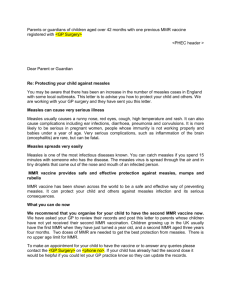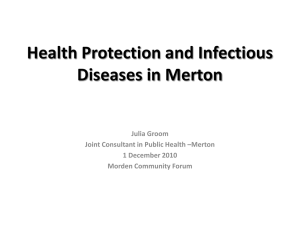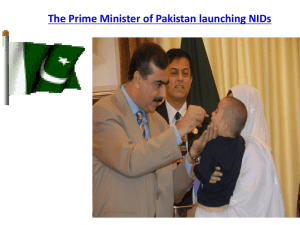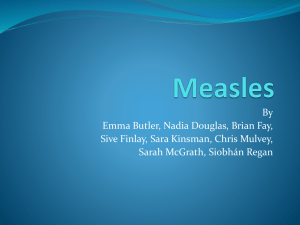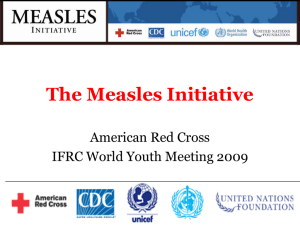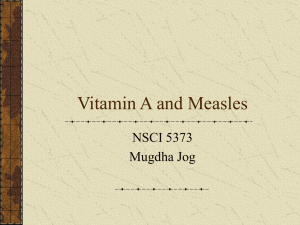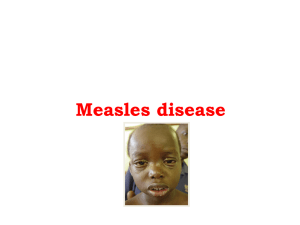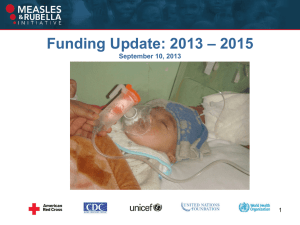Presentation - Measles on Call by Suzanne Meredith
advertisement
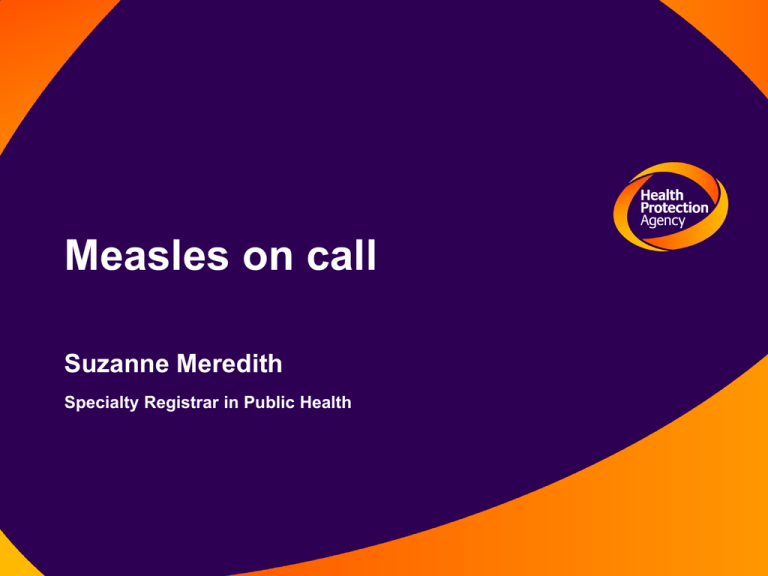
Measles on call Suzanne Meredith Specialty Registrar in Public Health Measles on call • Clinical Features • Epidemiology • Prevention and Control • Diagnosis • Example of On call case / action Measles Measles is one of the most highly infectious diseases known. Agent: Systemic viral infection caused by a paramyxovirus Reservoir: Humans Transmission: spread person to person by direct contact with nose and throat secretions or respiratory droplets, Incubation period: 7-18 days, av 10 days Infectious period: 4 days before – 4 days after rash. Laboratory confirmation: PCR testing of oral fluid , urine, CSF or tissue or serology (single raised IgM or rise in IgG). Clinical Features • Prodromal illness – high fever, coryzal respiratory infection • Cough, Conjunctivitis, runny nose • Koplik’s spots – early part of illness, look like grains of salt on a red inflamed background in the mouth • Rash starts day 3 or 4, red, blotchy, maculopapular, not itchy, begins on face and behind ears, then generalised • Complications: debilitation, pneumonitis, acute otitis media, pneumonia, encephalitis. • Measles can be particularly severe in susceptible infants, pregnant women, and immunocompromised individuals. Surveillance Suspected Suspected by clinician or person with fever and maculopapular rash and one of: cough, coryza or conjunctivitis Confirmed Measles IgM positive in blood or oral fluid Epidemiologically linked Person with signs and symptoms of measles in contact with a lab confirmed case 7-18 days before onset of symptoms Confirmed Measles Cases 2007-2012 Confirmed measles cases in travellers, 2012 (n=210) Level 3 outbreak declared week 29 Measles cases in travellers reported in HPZone 2012Region (up to Sep 2012) Confirmed (by Not Colindale) confirmed EM EM EoE London NE NW NW NW SE SE SW WM WM WM Y&H Y&H Y&H East Midlands North East Midlands South Bedfordshire and Hertfordshire South West London North East Cumbria and Lancashire Cheshire and Merseyside Greater Manchester Sussex and Surrey Thames Valley South West (North) West Midlands East West Midlands North West Midlands West South Yorkshire North Yorkshire and Humber West Yorkshire Grand Total Not yet Grand tested total 8 (8) 9 (9) 1 3 3 8 12 20 4 (4) 0 4 (4) 30 (29) 13 (13) 9 (9) 4 (4) 2 (4) 1 (1) 15 (15) 6 (6) 10 (10) 2 (1) 0 0 0 2 1 0 1 0 0 0 0 0 0 0 2 11 13 6 3 3 3 1 7 8 5 2 4 2 15 45 20 12 8 5 2 22 14 15 4 10 (10) 1 (1) 128 (126) 1 0 9 7 0 82 18 1 219 Prevention and Control • Measles Vaccination introduced in 1968 • MMR 1988 • 2 doses required • Late 1990s- early 2000s controversy links with autism and Crohns disease • WHO target 95% MMR Percentage of children immunised by their 2nd birthday, 2011-12 by PCT England % 91.2 East Midlands Bassetlaw PCT Derby City PCT Derbyshire County PCT Leicester City PCT Leicestershire County & Rutland PCT Lincolnshire Teaching PCT Northamptonshire Teaching PCT Nottingham City PCT Nottinghamshire County Teaching PCT 92.9 90.1 93.4 94.5 93.0 94.6 91.8 93.9 88.8 92.0 On call 28th – 29th September 2012 23:52 28th September (Friday night) Paediatric Registrar notification of suspected measles in a traveller 15 year old girl. On Call action Obtain history of immunisation Contact with suspected or confirmed cases and travel Is diagnosis likely? Identify vulnerable contacts and assess susceptibility (Hawker and Begg) Clinical History 6 day history of headache, sore throat, sore eyes, cough, runny nose Seen by GP previous day ?viral tonsillitis Had 1 day of antibiotics Today onset of maculopapular rash- started on face, behind ears, spread to include chest and back 1 white spot in mouth - ?Koplik Spot Information from Registrar obtained from mother Not had MMR Lives on a traveller site No known cases on site but attends a church where measles has been reported Lives in a caravan with mother, father and brother, aged 4 A number of other children on the site are unvaccinated Diagnosis The positive predictive value of a clinical diagnosis of measles is generally poor when cases are sporadic and outside of an outbreak situation but in recent months HPU reported more ad-hoc cases. In the absence of laboratory results, the diagnosis of measles will depend upon a combination of epidemiological and clinical factors Management will normally have to precede the results of laboratory testing (even where requested urgently) Is measles likely/unlikely? • Assessment by experienced member of HPU • Source? Contact with another case? Traveller community? Recent travel to endemic country? • Vaccination status? • Clinical History Assessment of Contacts 1.Immunocompromised 2.Pregnant women, infants 3.Health Care Workers 4.Healthy contacts Has there been a significant exposure? 4 days before – 4 days after rash appears • Less than 15 minutes exposure to a case can lead to disease in a susceptible person. • Is the exposed individual likely to be susceptible? • Infants, pregnant women and immunosuppressed individuals should be assessed for susceptibility according to the HPA Post Exposure Prophylaxis for Measles guidelines. Contact information given by Paediatric Registrar 00:34 on Saturday morning Contact information given by Mother 9am on Saturday morning Actions: • Pregnant lady asked to go to QMC for IGG test • Phoned QMC to arrange • 2 other babies to attend local hospitals for HNIG • Details obtained and provided to 2nd on call to arrange with Birmingham • HPA advised unless confirmed epi link to a confirmed case not to issue HNIG until case tested IgM +ve. • New swab and blood test taken and sent for urgent testing • Grandmother – not immunocompromised- no further action • MMR for other children – now dispersed- advised to attend GP on Monday Post on-call outcome •2nd on call spoke again to 2 mothers re HNIG for babies and risks Monday: •PCT’s alerted to probable measles case •01/10/12 Measles confirmed +ve IgM PCR nasal swab and blood •Practice Nurse contacted to arrange MMRs @ caravan site – majority from site attended the practice for MMR •HNIG organised for babies – 1 had it, 1 refused •The mother who refused HNIG for baby attended practice to get 2nd child MMR •Staff reiterated the importance of HNIG and the risks of measles •Pregnant woman tested IgG +ve – no HNIG required •Visit to site by HPA – only 2 caravans left – most moved away- revisited again to take swabs 4 days later Secondary cases MMR HNIG MMR HNIG Key points: • Communication issues – no phones/ did not answer • Moved away – difficult to contact / spread of infection to other sites • Lots of young children – all with no MMR • Large amounts of communication and work between HPA/ GP and PCT re immunisation • Several secondary cases References: 1- Hawker & Begg, Communicable Disease Control and Health Protection Handbook, Wiley-Blackwell, 3rd Edition, 2012. 2. Health Protection Agency National Measles Guidelines http://www.hpa.org.uk/webc/HPAwebFile/HPAweb_C/1274088429847 3. Health Protection Agency Measles Surveillance Information http://www.hpa.org.uk/web/HPAweb&HPAwebStandard/HPAweb_C/12230 19390211?printable=true 4. Department of Health, The Green Book https://www.wp.dh.gov.uk/immunisation/files/2012/07/Chap-21dh_122643.pdf 5. Health Protection Agency. Post Exposure Prophylaxis for Measles guidelines. http://www.hpa.org.uk/web/HPAwebFile/HPAweb_C/1238565307587 6. The NHS Information Centre , NHS Immunisation Statistics, England 2011-12 https://catalogue.ic.nhs.uk/publications/publichealth/immunisation/nhs-immu-stat-eng-2011-2012/nhs-immu-stat-eng2011-12-rep.pdf Acknowledgements Jane Freeman, East Midlands HPU (North) Vanessa Macgregor, East Midlands HPU (North)
